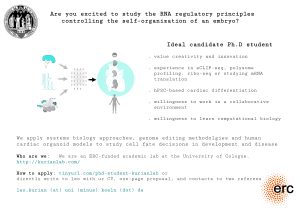Ph.D. position- Kurianlab@ University of Cologne, Germany: RNA regulatory principles controlling cell fate and identity during cardiac development using human pluripotent stem cell-based differentiation and organoid models
Posted by Leo Kurian, on 27 July 2022
Job type: PhD
Location: Cologne, Germany
Closing Date: 31 August 2022

Research overview:
We are an RNA biology lab studying the fundamental principles governing the self-organization of an embryo and its disease implications. We focus on RNA regulatory elements (e.g: long non-coding RNAs, selective translation factors) that control the acquisition of cell fate and maintenance of cellular identity (Cell Stem Cell 2019, EMBO Reports 2019, Circulation 2015). We use a holistic approach that combines human pluripotent stem cell-based differentiation models, including organoids, genome engineering tools, and systems-wide methods such as eCLIP-seq and Ribo-seq.
To familiarize yourself with the concepts we investigate and our approaches, please refer to:
- Frank S, ….Kurian L, yylncT Defines a Class of Divergently Transcribed lncRNAs and Safeguards the T-mediated Mesodermal Commitment of Human PSCs, Cell Stem Cell. 2019 Feb 7;24(2):318-327.e8.
- Ahuja G, ….. Kurian L, Loss of genomic integrity induced by lysosphingolipid imbalance drives ageing in the heart, EMBO Rep. 2019 Apr;20(4):e47407.
Please visit http://kurianlab.com/ to learn more about the group’s interests and ongoing research.
Your responsibilities will include:
- generation of CRISPR/ Cas9 mediated knock out of a selected set of candidate RNA regulatory factors in human pluripotent stem cells
- investigate the mechanisms and processes controlling cell fate decisions using differentiation approaches, including organoid models
- biochemical analysis of protein-RNA interactions
- willingness to learn and integrate basic computational pipelines for RNA seq and eCLIP seq into your project workflow
Required skills and qualifications:
- M.Sc. or equivalent degree in developmental biology, biochemistry or computational biology, or a related field, completed with above-average grades
- experience and publication record in stem cell biology, RNA biology, or computational biology
- thorough conceptual understanding of developmental biology and RNA biology
- enthusiasm and motivation to learn new techniques and computational approaches
- ability and willingness to work in a collaborative team
- excellent communication in English (written and spoken)
Desired qualifications:
- hands-on experience in developmental biology, stem cell biology, RNA biology, or computational biology.
- experience in basic molecular biology and biochemistry
We offer:
CMMC, along with its partner institutes such as the Cologne Cluster of Excellence in Cellular Stress Responses in Aging-associated Diseases, Cologne Center for Genomics, and Max-Planck Institute for Biology of Ageing research, all located in the same campus, provides a vibrant scientific community.
Your salary will be based on TV-L / TV-Ä.
Suitably qualified women could be given preferential consideration unless other applicants clearly demonstrate superior qualifications.
Please address telephone inquiries to Dr. Leo Kurian at +49 221 478-89692 or leo.kurian (at) uni-koeln.de
How to apply
Have we awakened your interest? Please submit your application package directly to Leo or apply through the application portal.
email: leo.kurian (at) uni-koeln.de
Portal: https://jobs-uk-koeln.de/index.php?ac=jobad&id=3924
Please include in your application package the following
- ~1-page motivation letter detailing (i) Research interest, (ii) past experience, (iii) motivation to apply to our lab
- detailed CV including list of publications (if any) and contact details of 2 referees
reference number: 00002939
Salary: According to DFG regulations
Closing Date: 31 August 2022
Scientific fields: Cell fate control and differentiation, Cardiovascular development, Computational and systems biology, Development and disease, Early embryogenesis, Gene regulation, Growth control, Metabolism and physiology
Model systems: Human, Organoid, Cell culture, Mouse
Duration: Fixed term
Minimum qualifications: Master of Science

